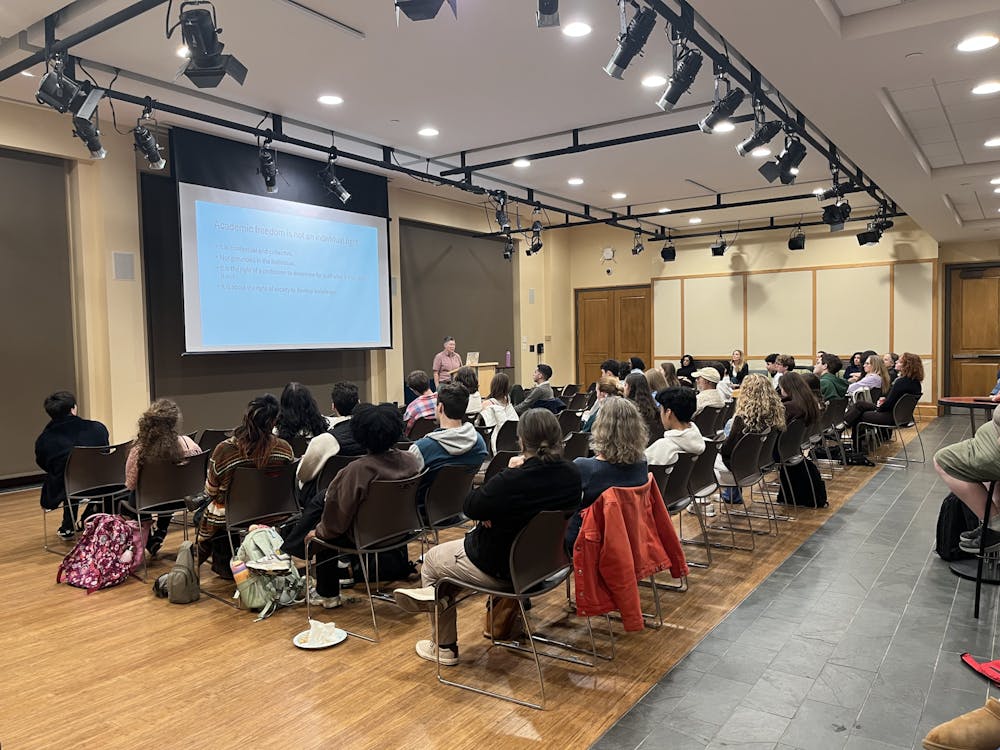Finance students involved with the Student Managed Investment Fund, called SMIF or Spider Fund, are working to adjust investment strategies with $300,000 of the university's endowment.
As the Dow Jones industrial average dropped on Wednesday to 9258.10, down 189.01 from the previous day's close, fourteen of the university's top finance students who comprise the Spider Fund are putting their education to use by working to ensure the school's money will survive a volatile stock market and uncertain economy.
This portion of the school's estimated $1.6 billion endowment has been in the hands of Spider Fund members for 10 years. The fund allows senior finance students the opportunity to put their classroom learning into practice, said Michael Fredrickson, one of the managers for the growth fund.
The $300,000 is split into two funds that are completely student-run. Each team generates its own investment strategy and manages its fund independently of the other. There are generally between 10 and 20 stocks in each fund's portfolio, and currently each fund's portfolio consists of eight.
The two main objectives of the Spider Fund are to enhance the students' knowledge of equity markets and portfolio construction and to generate positive returns on the school's capital.
Professor John Earl acts as the Spider Fund's adviser and works closely with the general manager to make sure things are functioning correctly. He is also there as a resource and answers any questions the managers may have, but does not have a say in the stock picks or voting, Fredrickson said.
Seven of the Spider Fund's members serve as managers for the growth fund and another six serve as managers of the value fund.
Ryan Hill and Farah Mian are responsible for each the value and growth fund's trading, respectively. After the managers decide as a group on an investment, the trader then calls a broker at Davenport and Company, LLC, which is a full-service investment firm located in Richmond, to execute the trade.
The 14th member of Spider Fund is the general manager, whose responsibility it is to oversee both funds. Mike Weiss currently holds the position and he helps manage both funds, but he does not get to vote during investment decisions.
The growth fund focuses on investing in companies where the stock price is near a 52-week high and there is a high-growth prospect. Weiss emphasized at the growth fund's meeting Monday that there should be more focus on growth potential since many stocks will not be performing at 52-week highs because of the market's current state of instability.
At this time, the growth fund has equity positions in companies including Apple, Embraer, True Religion Jeans and Yum Brands and is looking to add news ones, Fredrickson said.
"Our strategy was to have mini ETFs for each industry," he said about the growth fund.
Enjoy what you're reading?
Signup for our newsletter
Exchange Traded Funds (ETFs) are investment vehicles traded on stock exchanges that bundle securities in a specific index into a fund that can be traded just like stocks. The Spider Fund can only take long positions -- buying positions -- in single-company stocks; the desired growth fund strategy was to use the ETF model and buy equity positions in a couple of companies per industry to diversify the portfolio's overall risk, Fredrickson said.
This approach has been changing because it has become increasingly difficult to be confident about a single company in current market conditions, he said.
The value fund's strategy differs from the strategy of the growth fund because the value fund focuses more on stocks that may be distressed and are deemed undervalued based on a series of analysis performed by the managers. These companies typically have low price-to-earnings ratios and do not have a tremendous amount of growth potential.
With a limited investment period and an unstable economy, the managers are trying to allocate as they best can and capture where the consumer is going in a time of lower spending, said Charlie Widmer, one of the value fund managers.
Most recently, the value fund has been looking at T.J. Maxx and Tyson as possible investments. Some of its current holdings are in Intel, General Electric and Johnson & Johnson. The value fund was also considering investments in companies like T.J. Maxx and Tyson during its meeting Wednesday evening.
The two funds gauge their investments based on six major industries, which include Consumer Discretionary, Consumer Staples, Energy, Healthcare, Industrials, Information Technology and Materials. Financials are not one of the main industries the Spider Fund focuses on, but the growth fund does have a position in Lazard, a mid-sized investment bank.
"The safest thing to do right now is to keep a decent-sized cash position and overweight consumer staples and healthcare," Fredrickson said.
Right now both funds are made up of more than 50 percent cash, but Weiss said he wanted to invest a portion of outstanding cash in the coming weeks.
Each of the two funds uses a market benchmark by which it measures performance. The student-managed growth and value funds' benchmarks are the S&P 500 growth and value funds, respectively.
Currently both funds are down, but still outperforming their benchmarks. As of market close on Wednesday, the growth fund was down 5.79 percent while the benchmark was down 23.92 percent, and the value fund was down 8.66 percent while its benchmark was down 29.15 percent.
Some of the market's recent volatility has been a result of uncertainty derived from the passage of the $700 billion bailout plan and its implications for the future.
"It was a necessary evil that needed to get passed in order to get things started and unfreeze the credit markets," said Nick Keches, one of the growth fund managers.
Keches said he didn't think Wall Street would ever be as profitable as it had been in the past three years.
"There will be a lot of uncertainty in the near future, and it will take some time to see what these assets are actually worth," Fredrickson said. "I don't personally see the equity markets turning around until the end of the year., or the first quarter of 2009."
A number of Spider Fund members also expressed concern about the job market and what the current job-search process has been like in the financial industry.
"It's really forced me to look at places I didn't think I would be looking for a job," Keches said.
Keches said he had originally wanted to get into a training program at one of Wall Street's large investment banking training programs. Now some of these no longer exist or the programs have suspended full-time recruiting. Keches has shifted his focus to mid-sized investment banks and investment management firms in cities around the United States as well as in Asia and Europe.
Looking for a job is like taking two to three extra classes, he said, and said he would apply to about 30 institutions worldwide.
Some students are also going beyond the Career Development Center's resources as they may have in the past; students are now tapping into all of their networks and doing a lot of the groundwork on their own, Fredrickson said.
Similar to Keches, Fredrickson's ideal situation was to get into a top-tier internship program in Boston or New York, and he said he had hoped to get a full-time offer as a result of that experience.
If you looked at the students who were involved with Spider Fund two years ago, many of them had prestigious internships with job offers that followed, he said.
Five to six of the students involved with Spider Fund, including Fredrickson, have received full-time offers, and as of now four have accepted.
Fredrickson received a full-time offer in a sales position for a financial services firm in Richmond, but said he was keeping his options open for the time being and seeing what else might be available.
Mian also commented on how her job search was progressing, and said she had been using resources from other universities that her friends go to so she could increase the number of possibilities available to her.
She searched the career development resources and job postings from other schools, including Northeastern University, Boston University and the George Washington University, and applied to firms that may not be recruiting at Richmond, she said.
She was supposed to work as an intern at Lehman Brothers this past summer, but the program was suspended.
The Spider Fund will have its semi-annual meeting with its advisory board on Oct. 16. Members of the fund will present an overview of the fund, an explanation of executed trades and discuss the highlights and lowlights of the funds investments thus far.
Contact staff writer Jessica Murray at
href="mailto:jessica.murray@richmond.edu">jessica.murray@richmond.edu
Support independent student media
You can make a tax-deductible donation by clicking the button below, which takes you to our secure PayPal account. The page is set up to receive contributions in whatever amount you designate. We look forward to using the money we raise to further our mission of providing honest and accurate information to students, faculty, staff, alumni and others in the general public.
Donate Now


